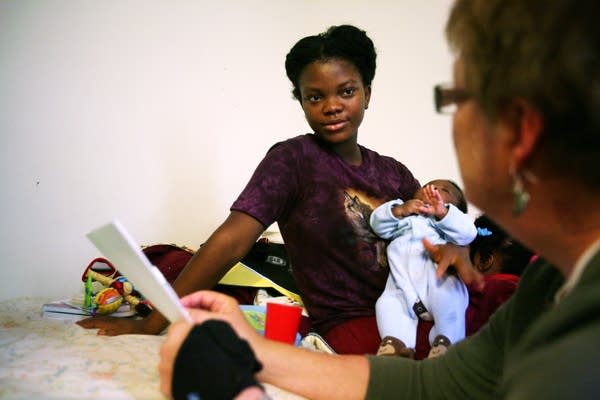Census: Child poverty rate triples in Brooklyn Park
Go Deeper.
Create an account or log in to save stories.
Like this?
Thanks for liking this story! We have added it to a list of your favorite stories.

Unemployment and foreclosures continue to strain many Minnesota families, and more children are slipping into poverty, according to figures released Thursday by the Census Bureau's American Community Survey.
In the Minneapolis suburb of Brooklyn Park, the statistics are more glaring. There, about one of every three children lives in poverty, which is about three times the rate of 2006.
That period covers a turbulent time for resident Evelyn Goodman. The single mom of five children has been out of steady work for the past two years, ever since she lost her job at a gas station. Goodman says in this economy, even menial jobs for someone like her are out of reach.
"Even when I was 17, it wasn't hard for me to get a job without a high school diploma or a GED," she said. "As long as I could do the performance, keep up with it, you could get a job. Now it's not like that."
Turn Up Your Support
MPR News helps you turn down the noise and build shared understanding. Turn up your support for this public resource and keep trusted journalism accessible to all.
Goodman's family of six lives on food stamps and about $1,400 a month in disability payments. She worries that her older kids could fall into the wrong crowd. So she tries her best to do things as a family, but says she's running out of options.

"I don't tell them we're going to go to the park tomorrow, because I never know if I have gas money, or what's going to come about," she said. "It's scary, but it is what it is. I live day by day."
Goodman says subsidized youth programs have been harder to find in Brooklyn Park than in her hometown of Minneapolis. And her eyes fill with tears when she thinks about how the family celebrated her oldest daughter's 17th birthday.
"You now what we did for her birthday? We sat in the house, and looked at the four walls. And I felt so bad," Goodman said. "It was the worst feeling ever. I had to explain it to her. She was understanding, but I could tell she was hurt. No cake, no nothing."
Goodman says she's determined to get back on her feet and set a better example for her kids. She finds temporary jobs that pay close to the minimum wage. On days when the temp agency doesn't call, she goes GED classes. At the nearby Community Corner in Brooklyn Center, she also receives food assistance and attends a support group for struggling parents like her.

Linda Hanka runs the center, which is housed in a former convenience store surrounded by working-class apartment buildings. She says some of the parents who are seeking help there were living solidly middle-class lives, before foreclosures or job losses knocked them down.
"Many of the people who are coming in for jobs now here are people who have degrees," Hanka said. "They're not people who are just wanting jobs from McDonald's. They are people with marketable skills, where they were earning six figures, and now they're unemployed."
Kids often feel the brunt of these hardships, and child poverty statistics alarm not only social workers, but scientists and public health workers, too. They say the conditions in the first few years of a child's life can shape future development.
The Minnesota Visiting Nurse Agency is one organization among many around the state trying to help these families through distressing times. One of its nurses, Jeanne Kumlin, recently paid a visit to 19-year-old Garmai Tokpa, who shares a crowded Brooklyn Center apartment with her six-week old son, along with her sister's family.
With a questionnaire in hand, Kumlin tried to gauge baby Joshua's communication skills.

"Does he make gurgling sounds?" Kumlin asked.
"Yes, he does that too. And he smiles," Tokpa replied.
Kumlin said she's vigilant for any signs of slow development, because babies born into poverty and chaos can have a tougher time adapting to school later in life.
"If mama's stressed, baby's stressed. Baby spends so much energy coping with the stress that their brains can't focus on the development that needs to happen," Kumlin said. "We see language delays, motor skills delays, a lot of acting out, and things to make it harder for kids to function in school because they're in an environment that's unhealthy."
But judging from today's assessment, baby Joshua appears to be developing right on schedule. Kumlin says Joshua's mom, who nuzzles up to his face and laughs with him, is attentive and nurturing.
"Even though they're living in poverty, I know Garmai is going to raise him with a lot of love and affection," Kumlin said. "So he'll be fine. It's the babies who don't have this tender loving care that we all need, that will suffer down the road."
Dear reader,
Political debates with family or friends can get heated. But what if there was a way to handle them better?
You can learn how to have civil political conversations with our new e-book!
Download our free e-book, Talking Sense: Have Hard Political Conversations, Better, and learn how to talk without the tension.







